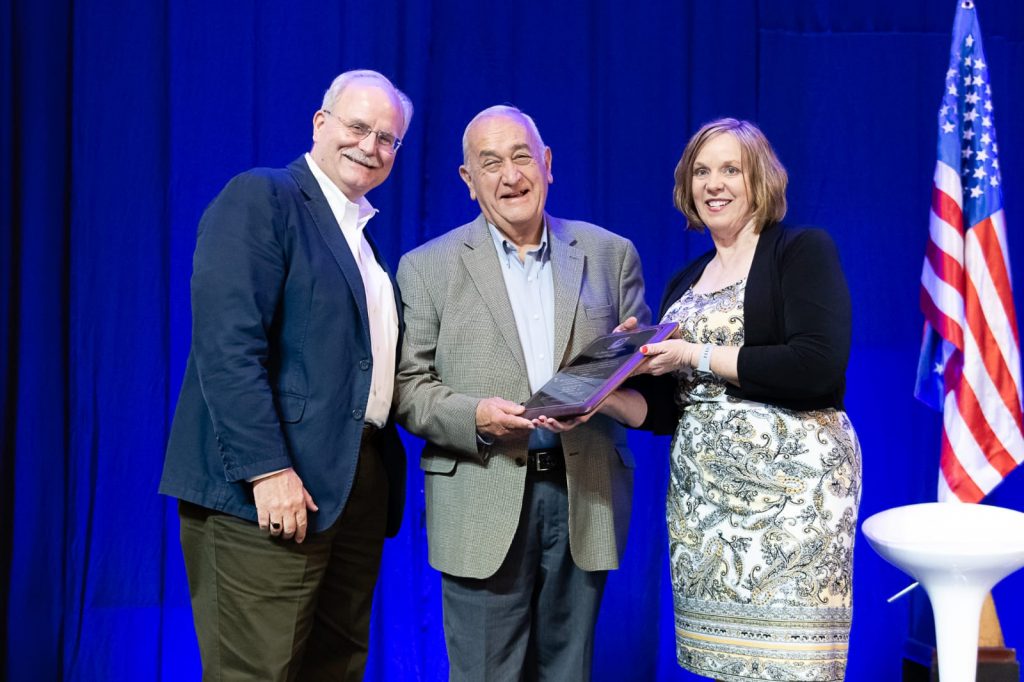Quiet confidence defines Jaime Cuellar’s character. A longtime U.S. Grains Council consultant native to Colombia, he has worked in the Council’s Latin American region for more than 20 years.
Cuellar was recognized by the Council’s membership during a special session of the 16th International Marketing Conference and 59th Annual Membership Meeting this week in Cartagena celebrating the relationship between the two countries.
In his time with the Council, his elevator speech has become part of who he is, and one Cuellar repeats often: “The U.S. Grains Council is a highly recognized and respected institution internationally known for its transparent and effective methods of conveying useful and trustworthy promotional information on U.S. feed grains and their co-products, barley and ethanol.”
Over his 23 years with the organization, Cuellar has been a tremendous advocate and voice for U.S. farmers and agribusinesses.
“Jaime has played an instrumental part of the Council’s programs in Latin America during a time of significant and exciting change,” said USGC President and CEO Tom Sleight. “A major part of his responsibilities with the Council included developing key relationships with Colombian importers, end users and government officials and being part of the important success story for U.S. agriculture in this key market.”
Marrying relationship-building with trade servicing on behalf of U.S. grains has served Cuellar well, and he is happy to pass along words of wisdom to his contemporaries.
“We have an enormous responsibility on our hands,” Cuellar said. “When one realizes the fabulous perspectives in dealing with foreign citizens in many countries around the world to develop business relations and learn about cultures, it turns into a great opportunity to understand and appreciate them and how we can assist in their development.”
When he first began work with the Council, Cuellar carried out customer service visits with potential grain customers in the local poultry, swine and dairy cattle operations, conveying information on the atributes of U.S. feed grains and how the U.S. grain marketing system could contribute to the success of their businesses.
He began as a livestock technical consultant in Bogota in 1996. Gradually, the scope of this work expanded to other nations in the Latin American region including Peru, Ecuador, Chile, Venezuela and the Caribbean. When the Bogota office closed, he became a regional consultant, building events and activities including procurement seminars, risk management workshops, working with experts from leading U.S. universities and conducting Colombian missions to the United States.
Cuellar has seen through a number of challenges to U.S. grain imports in Latin America, but with his continued quiet confidence, none was more rewarding than the trial of getting U.S. DDGS into Chile.
“Getting a local dairy cattle coop motivated to run feeding trials in Southern Chile with DDGS was a huge challenge I remember,” Cuellar said. “Membership in this organization is made up of highly professional and efficient producers with strict and technical methods of production. Gradually we convinced them to conduct feeding trial with DDGS from the U.S. in several herds, under the supervision of their nutritionists along with an expert from the University of Wisconsin.
“After nearly a year of consistent work, the results in these trials were very successful and promising. The hardest hurdle encountered was the price concern, when compared to alternative protein supplements available in that part of the world, but I feel we were successful.”
Cuellar said working in today’s business environment requires being both aggressive and humble.
“Always show respect and interest when meeting business counterparts and always keep in mind that we act as ambassadors in good faith of the great institution the U. S. Grains Council is. When one acts as a diplomat, one gains the confidence to be successful.”
About The U.S. Grains Council
The U.S. Grains Council develops export markets for U.S. barley, corn, sorghum and related products including distiller’s dried grains with solubles (DDGS) and ethanol. With full-time presence in 28 locations, the Council operates programs in more than 50 countries and the European Union. The Council believes exports are vital to global economic development and to U.S. agriculture’s profitability. Detailed information about the Council and its programs is online at www.grains.org.

